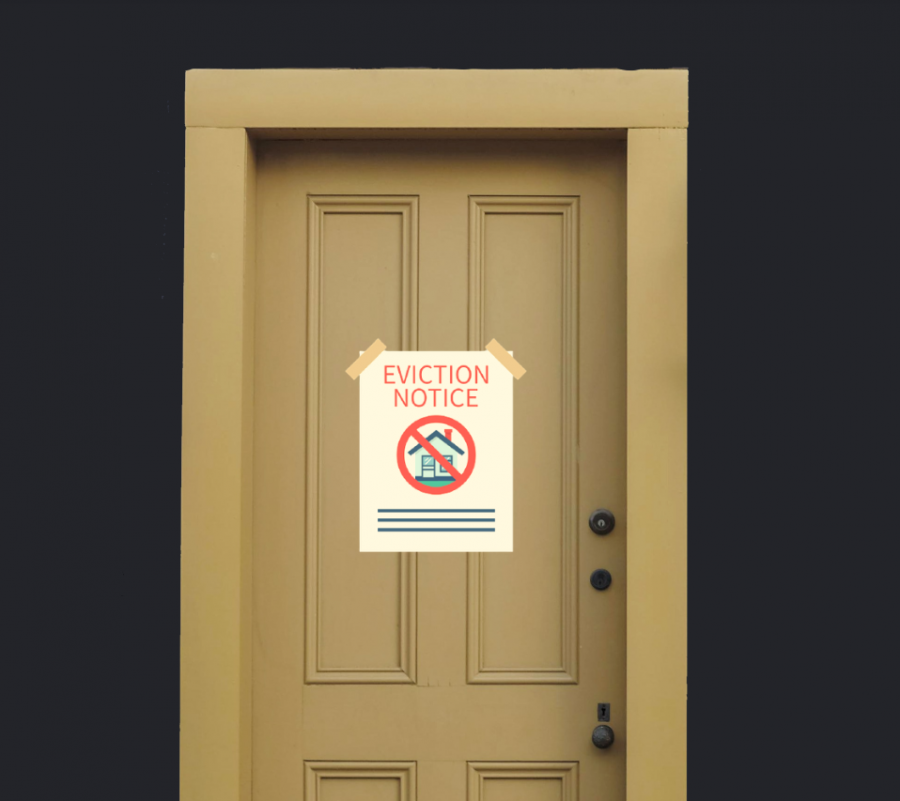Eviction Crisis: The End of the Moratorium
Due to eviction moratorium ending on Dec. 31, concerns arise about the tenants that are losing their homes and the effect it could have on the virus.
Dec 21, 2020
COVID-19 has left many families in a state of financial unrest. With millions of Americans unemployed, a new record since the Great Depression, and with Congress still divided on stimulus checks, many citizens live day to day worrying about losing their homes. On Dec. 31, the eviction moratorium, or the temporary stay put in place so that landlords cannot evict their tenants, will expire and the homeless masses could have a negative result on the spread of the virus and communities of color.
What is happening?
The Centers for Disease Controls’s momentary moratorium set, put in place after the Coronavirus Aid, Relief, and Economic Security Act’s moratorium expired on Sep. 4, is coming to a swift end. For people still struggling with paying their bills, January will prove to be a difficult month. Up to 40 million Americans nationwide could be left homeless, with nowhere to go, and no one to help them as the CARES Act might not receive enough funding to cover each and every case.
Not much word is coming from Congress either. On the Senate floor, both parties are torn on how the stimulus check should be given. By the time they decide, it might be either too late or not enough for most Americans. Currently, Congress has not agreed on a stimulus package. While both parties have agreed on a check: $500 for dependents, $1,200 for every person and $2,400 for every married couple, they have not yet agreed on whether it will be piecemeal or not.
Republicans are adamant about having legislation imposed in steps, while Democrats would rather it is done all at once. The Democratic Party wants to hold out for as long as they can to get both a larger stimulus package and higher funding. This deadlock is what is ultimately preventing Americans from receiving a second stimulus package.
What does this mean?
This eviction crisis could lead to a multitude of things. One concern is the propagation of the virus. Forcing thousands into the streets while the Center for Disease Control and Prevention is recommending that they quarantine themselves will likely end up spreading the virus even more. Doctors and researchers recommend only to go out when necessary, wear a mask, stay 6 feet apart, avoid crowds, and wash your hands whenever possible. Physical and mental ailments will only increase a person’s likelihood of catching the virus. Outside, people are subject to all the elements, and with temperatures swiftly dropping as low as 30 degrees Fahrenheit, this will only worsen over time. In addition, the stress, anxiety and depression that come with losing a home will negatively affect immune health.
This issue will also disproportionately affect communities of color. COVID-19, in general, has been proven to affect people of color inordinately when compared to their white counterparts, as they experience higher rates of infection and hospitalization. Plus, up to 80 percent of the evictions are nonwhite households. Black households are twice as likely to face eviction and 1 in 5 black women have had an eviction notice.
Resources
Citizens can stay up to date on the eviction updates for their specific state on the National Low Income House Coalition website. If needed, they also have data organized in maps to make it easier to read.
If you or anyone you know needs resources and information on housing assistance, they can visit the official Miami-Dade government website. Feeding Florida also has resources for local food banks by county.
“I think others can definitely donate to shelters, partake in food drives, and donate money to these people because they definitely need it,” freshman Rocio López said.
Finally, for those who want to help, one can always get involved with local shelters, like Camillus House and Lotus House.












